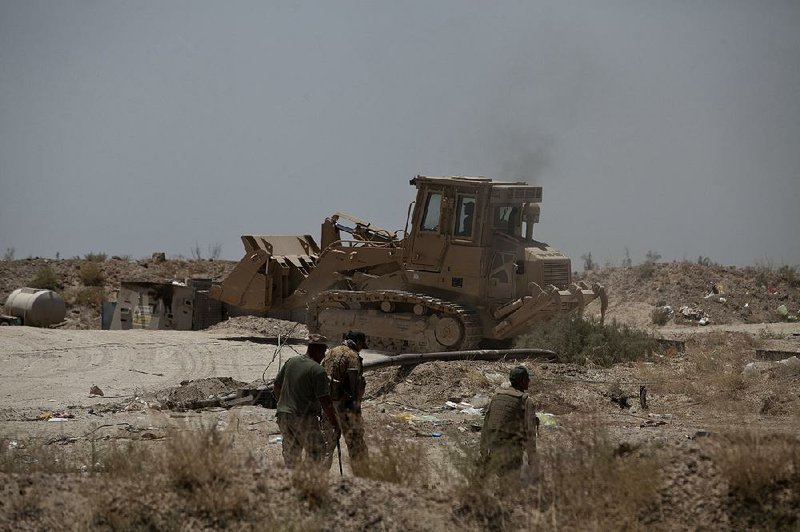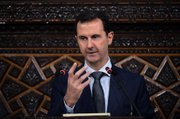NAYMIYAH, Iraq -- After securing the southern edge of Fallujah, seven battalions of Iraqi special forces units have been unable to advance for two days -- a delay that commanders say is due to disagreements about battlefield strategy against the Islamic State extremist group.
Unlike previous anti-Islamic State operations, the fight for Fallujah involves an array of Iraqi security forces, including the country's own military and Shiite militia groups.
In the battle for Fallujah, both forces are participating in the operation to retake the city, about 40 miles west of Baghdad.
The counterterrorism troops have been tasked with entering the city itself and the Popular Mobilization Forces have so far been restricted to clearing and securing Fallujah's outskirts. Both groups maintain their own command and control structure, creating a more time-consuming planning process than in recent anti-Islamic State operations in Anbar province, where the counterterrorism forces largely worked alone.
Maj. Ahmed Na'im with the Anbar police force said that while his men and the Iraqi federal police are fighting the same enemy in the same city, they never coordinate operations or share intelligence.
"They have their own plans and take their orders from their own people," he said.
Two days after taking up positions on the outskirts of Fallujah, one such dispute brought operations to a halt Tuesday.
The disagreement involved who should participate in the operation to clear the city of Islamic State fighters before an advance into Fallujah could begin, with some Shiite militiamen insisting they be part of that mission, said a senior Iraqi security official who spoke on condition of anonymity because he was not authorized to brief the media.
The Popular Mobilization Forces denied that. Hayder Mayahi, an official with the group's media office overseeing the Fallujah operation, said the group's fighters were ready to enter Fallujah if given the order but were standing down for now.
The spokesman for the U.S.-led coalition downplayed any suggestion that the operation had stalled.
"Iraqi forces are positioning to move forward," said Col. Christopher Garver.
"These are things that happen on the battlefield," he said, referring to the dispute over how the battle should progress.
Meanwhile, aid groups were increasingly expressing concern for the estimated 50,000 civilians trapped inside the city. In the months before the start of the operation, a siege around Fallujah led to reports of malnutrition as the price of food skyrocketed.
Since the assault to retake the city started two weeks ago, conditions for civilians in Fallujah have swiftly deteriorated. Fallujah residents speaking by phone said that during the first few days, Islamic State fighters handed out water and simple rations to civilians inside the city. But since then, no further supplies have made it in, they said.
"Another humanitarian tragedy is unfolding in Fallujah, and the worst is yet to come," said Bruno Geddo, the representative for the United Nations refugee agency in Iraq.
Meanwhile, the U.N. human-rights chief said there were "credible reports" that Iraqis fleeing Fallujah were facing physical abuse from some militia members as they escaped the city.
In a statement Tuesday from his office in Geneva, Zeid Ra'ad al-Hussein cited witness accounts that armed groups backing Iraqi security forces have detained some men and teenage boys leaving Fallujah with force that at times "degenerates" into abuse.
Zeid acknowledged that Iraqi forces have a "legitimate interest in vetting individuals fleeing ISIL-controlled areas" to make sure they don't pose a security risk, but he said those fleeing must be presumed to be civilians, barring "clear and cogent evidence to the contrary."
The statement comes after Human Rights Watch reported that Islamic State militants were gunning down people trying to flee the city.
"We're receiving more and more reports of abuses, including violations by ISIS and possible summary executions by government forces, against civilians that violate the laws of war," said Belkis Wille, an Iraq-based researcher with Human Rights Watch who is preparing to release a report on the abuses. ISIS and ISIL are acronyms for the Islamic State.
The findings are partly based on interviews with the area councilmen of Saqlawiyah, a suburb of Fallujah. They said they have formally complained to Prime Minister Haider al-Abadi's office about the abuse of at least 1,250 men who were reportedly detained and beaten by pro-government Shiite militias.
Assad confident of victory
In the ongoing fight against the Islamic State across the Middle East, Syrian President Bashar Assad vowed Tuesday that his troops would "liberate" every inch of Syria, just like they recaptured the ancient town of Palmyra from the extremist group.
With Iraqi forces focused on Fallujah, Syria's military is pressing on toward Raqqa, the extremist group's declared capital.
Assad's remarks in parliament came as his opponents, backed by Turkey and Saudi Arabia, are struggling for survival and his troops have almost encircled rebel-held neighborhoods of Aleppo, Syria's largest city.
Saying the military situation was much better than it was months ago, Assad told the lawmakers that Aleppo will be "the graveyard where the hopes and dreams of the butcher Erdogan will be buried."
The reference was to President Recep Tayyip Erdogan of Turkey, one of the supporters of the rebels fighting to topple Assad in the country's yearslong civil war.
In March, government forces evicted the Islamic State from Palmyra, a desert town in central Syria famous for its Roman-era ruins.
"The way we liberated Palmyra, and before that many areas, we will liberate every last bit of Syria from their hands. We have no choice but to be victorious," Assad said to applause.
"Our war on terrorism will continue not because we like war. They imposed the war on us," he added. "The shedding of blood will not end until we uproot terrorism, wherever it is."
The speech was Assad's first to Syria's newly elected parliament and his first public remarks since January. He also thanked China for using its veto at the U.N. Security Council months after the crisis began to prevent the imposition of sanctions on Syria as well as Russia, Iran and Lebanon's Hezbollah group -- three key allies that have played a critical role in boosting Assad's forces.
Assad spoke as a military advance is underway to capture key urban strongholds of the Islamic State in Raqqa. The Syrian army, backed by Russian airpower, is moving from the southwest, while the Syria Democratic Forces is pushing from the north and west.
Information for this article was contributed by Susannah George, Albert Aji, Bassem Mroue and Matthew Lee of The Associated Press and by Hugh Naylor and Mustafa Salim of The Washington Post.
A Section on 06/08/2016



